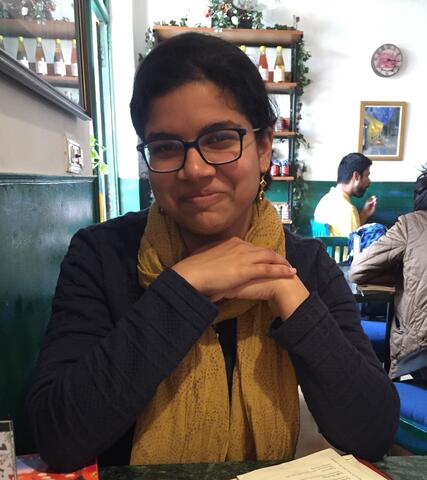If chatting about your neighbour’s brand new electric car tempts you to purchase one too, that exchange could have an impact on how researchers predict future climate change.
At least, that’s what Amrita Punnavajhala, an Applied Mathematics Master’s student, is studying now as she merges mathematical modelling with human sociology, psychology and geography to explore how collective decision-making may have an impact on climate systems. This work recently garnered her the 2021 Mehta-Jenner Climate Change Mitigation Graduate scholarship, which recognizes female graduate students who are passionate about the environment.
“It’s nice to know that someone wants to support you and believes in what you’re doing,” says Punnavajhala.
Adarsh Mehta (BMath ’98) and Jeffrey Jenner (BMath ’84) established the $10,000 award to celebrate women in the Faculty of Mathematics whose climate change research will have a positive impact on communities and the planet.
Whereas traditional climate change models account for human involvement and how we have an impact on climate change, Punnavajhala’s work takes mathematical modelling in a new direction. Rather than assuming the rate of social learning is constant around the world, her social climate models factor in human social and psychological forces–including how quickly humans learn behaviour from one another in specific locations.
For instance, if you live in a community where rooftop solar panels are the norm, you might be more likely to install them too, not necessarily because you’re passionate about green energy, but simply because we are all influenced by others’ decisions. These so-called “information cascades” can have an impact on whether we eat a plant-based diet, conserve water or turn the heat down a couple of degrees when friends are over.
“It could work negatively as well,” cautions Punnavajhala. “If people around you don’t separate their recycling, you might not feel so inclined to do that as well.”
Punnavajhala admits that social modelling is tricky since psychological forces are not always easy to measure. Besides, many factors are in play. Social and traditional media have an impact too, for instance. But the challenge is so intriguing, it actually drew her away from India to Waterloo when she discovered others here were studying innovative mathematical modelling to address climate change.
“I’d always seen mathematics as a very theoretical subject,” says Punnavajhala, who studied math in India as an undergraduate student. “But I always sensed I wanted to do something that was more meaningful. So when I spoke to Waterloo, it was exciting. I’d never realized that you could do math and end up in something like this.”





